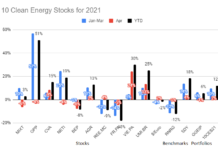This article continues a series on the companies in the Wise Energy Use index. I believe that the current turmoil has given stock pickers an opportunity to buy well capitalized firms which make money by helping people save money on energy. The industry is poised to do well in hard financial times, but companies with weak balance sheets or poor liquidity may not survive. In this series, I try to separate the wheat from the chaff. I generally liked the efficient lighting, and smart metering and energy management companies in the index, but wasn’t thrilled by any of the electric vehicle picks.
General Electric (NYSE:GE). GE has been a long-time favorite of mine (much to my dismay when it got caught with a small subprime exposure.) In the short term, GE has shown that it can still raise money even in troubled times by doing a (rather expensive) deal with Warren Buffett’s Berkshire Hathaway. The $3 Billion injection, followed by the $12B public offering was necessary because GE has long maintained a very low current ratio, something they were easily able to do in ordinary times due to their triple-A credit rating. Even a triple-A rated company (especially one with a large finance division) has trouble raising money in this market, and they need new cash to maintain that credit rating. I wish I had looked at GE two weeks ago when I started dumping companies which would need to raise financing. In fact, GE was a company I suggested would become a good buy when this market finds a bottom. Now that GE has strengthened their balance sheet, I’m comfortable with my stake.
Nevertheless, GE is a graphic example of what happens to companies which need to raise cash quickly when cash is tight. Consider the company’s recent drop in stock price, and then consider what would have happened without the extra confidence they obtained by bringing Warren Buffett on board first.
Honeywell (NYSE:HON). Honeywell, which I like for its building controls systems and performance contracting business, has an OK current ratio of 1.3, and a very strong operating cash flow equal to half the company’s total (not just short term) debt load, meaning they will probably not need to tap the markets for new funds in the near future. I’m holding my stake in this company.
International Business Machines (NYSE:IBM). IBM has a current ratio just over 1, and a strong operating cash flow sufficient to cover their total debt in two years. Although IBM’s push into solar was one of 2007’s most blogged stories, I tend to avoid solar companies because of the investor excitement around the sector. That said, there seems to be no reason to think IBM will have any immediate need to raise cash.
Johnson Controls (NYSE:JCI). Johnson Controls has long been my top energy efficiency pick among blue chip companies. With a current ratio of 1.2, and enough cash from operations to pay off their total debt in two years, the valuation is becoming increasingly attractive. In response to my (negative) article on electric car companies, a reader wondered if Johnson Controls was also risky because of exposure to car buyers needing financing. I like the current valuation, but, especially in the short term, we can expect earnings and cash flow to drop significantly. If I didn’t already own it, I’d be tempted to wait for the price to drop a little more before getting in, but I would not avoid the company all together, because they are well placed to buy up smaller battery companies to consolidate their lead in that market.
Siemens (NYSE:SI). Siemens also has a current ratio of 1.2, and enough cash from operations to pay off their total debt in two years. I’ve long liked Siemens for their interests in a wide variety of my favorite sectors, in addition to energy efficiency. They’re a global leader in electricity transmission infrastructure, efficient lighting, rail infrastructure, and have a strong wind turbine unit. Their wide array of businesses is less exposed to the potentially cash-strapped consumer than GE and Johnson Controls.
DISCLOSURE: Tom Konrad owns GE, HON, JCI, and SI.
DISCLAIMER: The information and trades provided here are for informational purposes only and are not a solicitation to buy or sell any of these securities. Investing involves substantial risk and you should evaluate your own risk levels before you make any investment. Past results are not an indication of future performance. Please take the time to read the full disclaimer here.









Thanks, Tom. I’ve been eagerly awaiting every entry in this series.